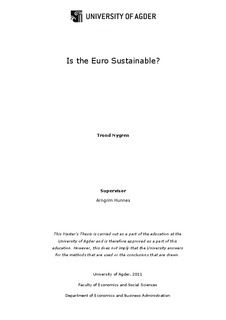| dc.contributor.author | Nygren, Trond | |
| dc.date.accessioned | 2011-11-24T09:21:38Z | |
| dc.date.available | 2011-11-24T09:21:38Z | |
| dc.date.issued | 2011 | |
| dc.identifier.uri | http://hdl.handle.net/11250/135602 | |
| dc.description | Masteroppgave i økonomi og administrasjon - Universitetet i Agder 2011 | no_NO |
| dc.description.abstract | The purpose of this thesis is to evaluate the economic sustainability of the Eurozone. The thesis has a macro-economic approach which looks at the Eurozone as a whole, with special emphasis on the peripheral countries of Europe that are experiencing a sovereign-debt crisis at the moment. Both economic theory and history will be used to illustrate the topic.
The role of the currency union in the time of crisis is the main scope of the thesis. A monetary union in reality means fixing the exchange rates of the members against each other. Many countries outside the Eurozone that were also suffering from the economic shock of the financial crisis used their monetary policy as a mechanism to restore competitiveness. Lowering the interest rate or printing money ensured liquidity in the markets to limit the damage done by the economic shock. In the Eurozone the monetary policy for all its members is governed by the European Central Bank in Germany. Members of the currency union therefore have to accept a common monetary policy for all countries within it. This is a major disadvantage of having a currency union, and the loss of monetary independence is the basis for a debate that will be analyzed in the thesis.
In the thesis both sides of this debate are presented. The criticism of the currency union has roots in the Optimum Currency Area theory (which is explained in the thesis), where Europe’s insufficient integration reveals flaws of the currency union. The economists arguing in favor of the currency union focus on the lack of realistic alternatives.
The combination of high debt, low investor confidence and no control over domestic monetary policy is a problem for many European countries. Considering how the Eurozone institutionally is set up at the moment there is no clear solution. No system of fiscal transfers to ensure liquidity is present. This makes it legitimate to question the sustainability of the currency union as it works now. Institutional changes are likely to happen.
This thesis presents proposals made by economists for such changes. The need for a crisis mechanism tool in order to prevent a future economic shock of having similar consequences as the shock of 2007/2008 has wide support. How it is going to work is a tense subject, as the richer countries of Europe are afraid of having to pay the periphery out of trouble. | no_NO |
| dc.language.iso | eng | no_NO |
| dc.publisher | Universitetet i Agder ; University of Agder | no_NO |
| dc.subject.classification | BE 501 | |
| dc.title | Is the EURO sustainable? | no_NO |
| dc.type | Master thesis | no_NO |
| dc.subject.nsi | VDP::Social science: 200::Economics: 210::Economics: 212 | no_NO |
| dc.source.pagenumber | 90 s. | no_NO |
